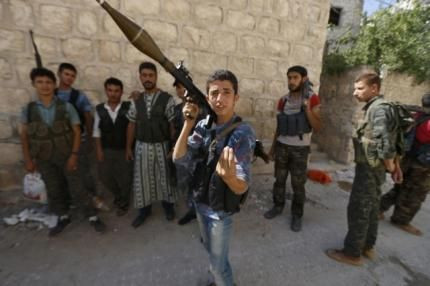Syrian Opposition Told US Senior Officials It Cannot Stop ISIS Without More Weapons

Since the Islamic State, formerly known as ISIS, took over Mosul, Iraq’s second largest city, in early June, opposition groups in Syria have warned the U.S. the Sunni militant group was also gaining ground in Syria. Now, senior opposition officials are telling the U.S. in private they need more weapons and financial support, or they will not be able to stop the ISIS advance.
But the Obama administration refused to get involved, even with the increasing threat to Americans in both Iraq and Syria.
“The moderate opposition is growing anxious,” said Mohammed Ghanem, a senior political adviser in Washington at the Syrian American Council, a grassroots organization based in Chicago. “No increase in support has been registered,” he said, adding the opposition has been promised more weapons in the past but has not received them in the field.
Ghanem said his organization has facilitated conversations between the leaders of three moderate opposition groups in Syria and officials at the National Security Council and State Department. He said he has met with them three times since the fall of Mosul June 10.
Senior officials held a conference call Aug. 15, Ghanem said, with the leader of a group defined by the U.S. administration as part of the moderate opposition in Syria. The call was facilitated by the National Coalition of Syrian Revolution and Opposition Forces, a group that represents the Syrian Coalition in the U.S. The Syrian Coalition includes multiple Syrian opposition groups.
Officials at the State Department asked the name of the particular faction, which has about 5,000 fighters, be withheld for security reasons, because it is at the forefront of the battle against ISIS, aka the Islamic State of Iraq and Syria, in Syria. It also is in charge of handling military operations for the Free Syrian Army. The group includes rebels from the Aleppo, Idlib and Hama areas, and represents one of the main groups in the Military Operations Center in Reyhanli, Turkey. The operations center hosts representatives from the U.S., Qatar, the United Arab Emirates, Turkey and Saudi Arabia, and coordinates support for the FSA.
In the conference call, the leaders of the group told senior U.S. officials the opposition in Syria was facing a serious shortage in funds and weapons, and it feared ISIS would take another key border crossing, Bab Al-Salama on the Turkish border.
The militant group already has access to the border between Syria and Iraq, and taking the Bab Al-Salama border crossing would allow it to control humanitarian aid and the free-flow of foreign fighters into Syria.
Notes from the conference call indicate the opposition group said on average, ISIS pays its fighters $400 a month, whereas the FSA, if it has the money, can only pay $100. It said it can only give its soldiers about 150 bullets a month compared to the more than 400 ISIS gives its fighters.
The U.S. has intervened in Iraq by conducting targeted airstrikes to stop the ISIS advance on Erbil, the capital of Iraqi Kurdistan, where American diplomats are stationed. The Syrian opposition has told the U.S. it wants to use similar tactics in Syria because the ISIS threats in both countries are similar.
Gen. Martin Dempsey, chairman of the Joint Chiefs of Staff, told reporters at the Pentagon last week ISIS could not be defeated without attacking its bases in Syria. But the Obama administration has yet to say whether it will pursue such military action.
Syria’s Foreign Minister Walid Al-Moallem warned against U.S. unilateral airstrikes without first speaking with Damascus. He said, though, Syria was ready to cooperate at the international level to fight the “war on terror.”
“But any effort to combat terrorism should be coordinated with the Syrian government,” al-Moallem told reporters in Damascus. White House Press Secretary Josh Earnest, however, told the daily press briefing Monday: “We are not interested in trying to help the Assad regime.”
Despite the lack of military intervention in Syria, the Obama administration has made efforts to support the opposition in other ways. In June it requested an additional $500 million to aid the Syrian opposition. White House officials said at the time of the announcement the program may not begin until next year and would rely on international partners. The program still needs congressional approval.
Earnest said the administration thought the moderate opposition in Syria could “play a role in marginalizing the influence of [ISIS].” But the opposition said in its conference call with U.S. senior officials Aug. 15 it would not be able to combat ISIS in northern Syria without considerable help.
In the meantime, ISIS has already begun advancing from the town of Al-Bab in eastern Aleppo province toward the northern Aleppo countryside and is seeking to take Azaz and Marea, two towns near the Turkish border.
© Copyright IBTimes 2024. All rights reserved.





















